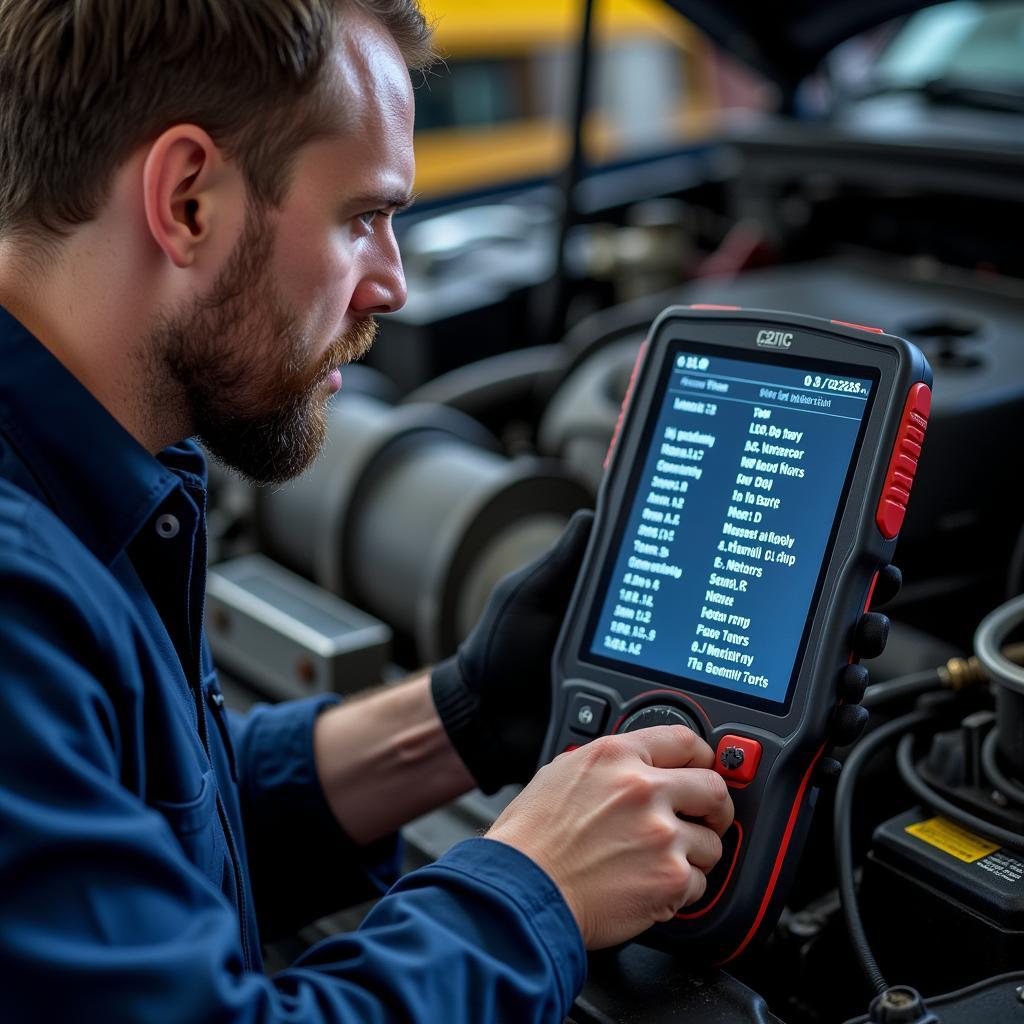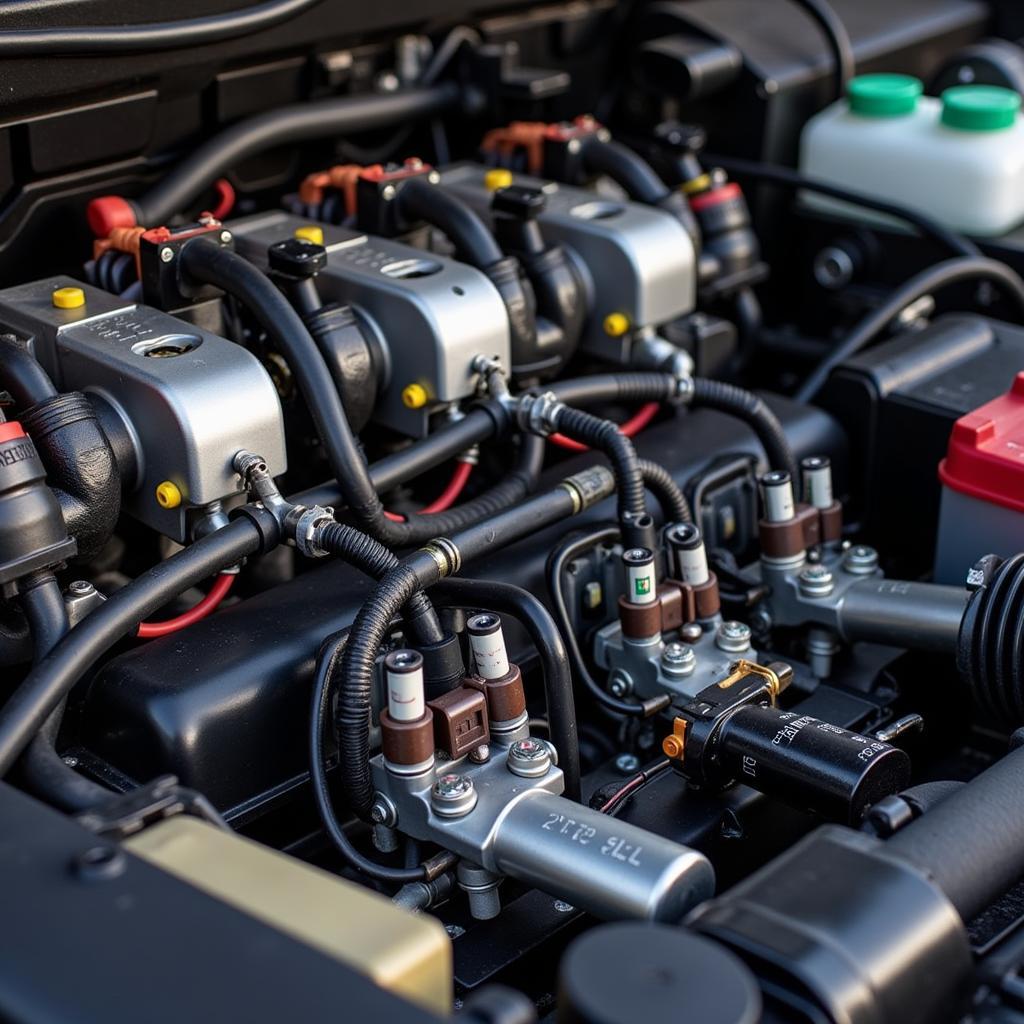Experiencing the frustration of your car refusing to start? It’s a common problem, and often the first thing that comes to mind is “What’s wrong?” While many factors can cause starting issues, a car diagnostic scan is a crucial step towards identifying the root cause. This comprehensive guide delves into the importance of a diagnostic scan after your car won’t start, helping you understand the process and potential outcomes.
Why a Diagnostic Scan Is Essential
Modern vehicles are equipped with intricate computer systems called Electronic Control Units (ECUs). These ECUs manage various components and functions, from fuel injection to ignition timing. When a problem occurs, the ECU often stores a Diagnostic Trouble Code (DTC) in its memory. A car diagnostic scan retrieves these codes, providing valuable insights into the potential issue.
Here’s why a diagnostic scan is crucial after your car doesn’t start:
- Accurate Diagnosis: A scan pinpoints the problematic system or component, avoiding guesswork and unnecessary repairs.
- Time-Saving: Instead of visually inspecting every potential culprit, a scan quickly narrows down the search, saving time and potentially costly labor charges.
- Cost-Effective: While some might hesitate at the initial cost of a scan, it can ultimately save you money by preventing misdiagnoses and unnecessary part replacements.
Understanding Diagnostic Trouble Codes (DTCs)
DTCs are alphanumeric codes that represent specific malfunctions detected by the car’s computer system. Each code corresponds to a particular issue, providing a starting point for diagnosis.
For example, a code like “P0301” indicates a misfire in cylinder 1. This information immediately directs the mechanic to investigate potential causes related to that cylinder, such as spark plugs, ignition coils, or fuel injectors.
It’s important to remember that DTCs are indicators, not definitive diagnoses. Further inspection and testing are usually required to determine the exact cause and necessary repairs.
What to Expect During a Car Diagnostic Scan
A car diagnostic scan is a relatively straightforward process, typically performed at a mechanic’s shop or dealership.
- Connecting the Scan Tool: A technician connects a specialized scan tool to your car’s OBD-II port, typically located under the dashboard on the driver’s side.
- Retrieving DTCs: The scan tool communicates with your car’s ECU, retrieving stored DTCs and displaying them on the tool’s screen.
- Interpreting the Codes: The technician interprets the codes, considering your car’s make, model, and specific symptoms.
- Further Inspection: Based on the codes and initial assessment, the technician may perform further inspections or tests to confirm the diagnosis and develop a repair plan.
 Mechanic Analyzing Diagnostic Results
Mechanic Analyzing Diagnostic Results
Common Causes of Starting Issues Revealed by Diagnostic Scans
While the specific DTCs and causes can vary, here are some common issues often revealed by a diagnostic scan when your car won’t start:
1. Battery or Charging System Problems
- Dead Battery: A weak or dead battery is a common culprit. A diagnostic scan can check the battery’s voltage and charging system performance.
- Faulty Alternator: The alternator keeps the battery charged while driving. A failing alternator can lead to a dead battery and starting issues.
2. Ignition System Malfunctions
- Worn Spark Plugs: Spark plugs ignite the air-fuel mixture in the cylinders. Worn spark plugs can cause misfires and prevent the engine from starting.
- Faulty Ignition Coils: Ignition coils provide the spark to the spark plugs. A faulty coil can result in a lack of spark and prevent the engine from firing.
3. Fuel System Issues
- Clogged Fuel Filter: A clogged fuel filter restricts fuel flow to the engine, potentially causing starting problems.
- Faulty Fuel Pump: The fuel pump delivers fuel from the tank to the engine. A malfunctioning pump can interrupt fuel delivery, preventing the engine from starting.
4. Sensor Failures
- Crankshaft Position Sensor: This sensor monitors the crankshaft’s position to control ignition timing. A failure can disrupt timing and prevent starting.
- Camshaft Position Sensor: Similar to the crankshaft sensor, the camshaft position sensor monitors valve timing. A failure can lead to timing issues and starting problems.
 Car Engine Components
Car Engine Components
What if My Car Starts After a Diagnostic Scan?
Sometimes, a car might start after a diagnostic scan even though the problem persists. This doesn’t necessarily mean the scan was pointless. Here’s why:
- Intermittent Issues: Some problems are intermittent, meaning they occur sporadically. The scan might have captured codes during a period when the issue was present.
- Clearing Codes: Sometimes, clearing the codes during a scan can temporarily resolve the issue, especially if it was related to a minor electrical glitch.
DiagFixPro: Your Trusted Partner for Car Diagnostics
When facing car troubles, a car diagnostic scan is an invaluable tool for accurate and efficient troubleshooting. At DiagFixPro, we offer expert diagnostic services, using advanced technology to pinpoint the root cause of your car’s starting problems. Our experienced technicians are dedicated to providing reliable solutions and getting you back on the road safely. Contact us today for reliable car diagnostics in swindon car diagnostic and mobile car diagnostics swindon.
FAQs
Q: How much does a car diagnostic scan cost?
A: The cost of a car diagnostic scan can vary depending on your location, the shop you choose, and the complexity of the issue.
Q: Can I perform a car diagnostic scan myself?
A: While DIY car diagnostic scan tools are available, it’s generally recommended to have a qualified technician perform the scan and interpret the results.
Q: Will a car diagnostic scan tell me exactly what’s wrong?
A: A car diagnostic scan provides valuable clues and narrows down the potential causes. However, further inspection and testing are often necessary for a definitive diagnosis.
Q: How often should I get a car diagnostic scan?
A: It’s a good practice to have your car’s diagnostic system checked annually as part of routine maintenance, or if you experience any warning lights or unusual performance issues.
Need More Information on Car Diagnostics?
Explore our comprehensive guide to car diagnostics windows for detailed insights and solutions.
Get in Touch with DiagFixPro
Need help diagnosing your car’s starting problems? Don’t hesitate to contact us via WhatsApp at +1(641)206-8880 or email us at [email protected]. Our team is available 24/7 to assist you.

Leave a Reply